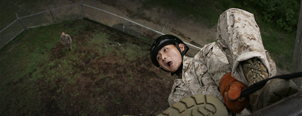
The Eagle, Globe and Anchor represents more than a symbol of the Marine Corps. While the eagle represents the United States, the globe means worldwide service and the anchor stands for the Marine Corps’ rich naval traditions, for Marines this is only scratching the surface of what the emblem represents.
It is the defining moment during boot camp, and I remember it well. Tired, dirty and sweaty after the Crucible, the final test before recruits earn the title “United States Marine,” I marched back realizing weeks of training were leading me to this moment.
| More: A look at the heroic Marines in our history who received the highest military honor |
I stood beside the other recruits in my boot camp platoon in front of the Marine Corps War Memorial, also known as the Iwo Jima Memorial. Our senior drill instructor stood before each of us, shook our right hand and placed a tiny piece of metal in the other.

The Eagle, Globe and Anchor is earned by Marines during Marine Corps recruit training. After weeks of training, the recruits earn the small piece of metal and the title “United States Marine.” This EGA was given to me before my first deployment to Afghanistan by Staff Sgt. Charles E. Fessler, who served with 1st Marine Airway during World War II.
I did not dare turn from him as he placed the emblem in my hand. The iconic symbol of the Marine Corps — the Eagle, Globe and Anchor — felt heavy. In actuality, the tiny piece of metal did not weigh much, but the rich history of the Marine Corps combined with being in front of a memorial dedicated to all Marines who have fallen for their country, seemed to be embodied in it.
With the emblem representing so much more than a piece of metal, I was surprised when I received a package from a complete stranger before I deployed to Afghanistan the year after I graduated boot camp. Wrapped tightly in a plastic bag, I found an EGA.
Also included in the package was a letter from Staff Sgt. Charles E. Fessler, who served four years with 1st Marine Airway. He graduated recruit training from Parris Island, S.C., during July 1942.
“It was important to me to give this Eagle, Globe and Anchor to a new Marine about to deploy,” Fessler wrote. “It was a bit of a good luck charm and a token to remember an older Marine and those from the past.”
It is hard to express the meaning of such a gesture. On the surface, it appeared to be a simple action accompanied with kind words. I knew Fessler, from Easton, Pa., saw it as something more, and it meant more to me, too.
“For me, the Eagle, Globe and Anchor is a symbol for the entire Corps,” Fessler went on to write. “Something in common and a bond between new Marines and old.”
The eagle represents the United States; the globe stands for worldwide service; the anchor for the rich naval traditions, but for many Marines that is only scratching the surface.
The EGA is as recognizable a symbol as any in the military. It is a symbol of pride to all Marines. I earned the title “United States Marine” and the right to wear the Marine Corps emblem. It is something no one can take away from me.
I realized when I first received the EGA from my senior drill instructor that I would always be a Marine. It motivates me to remember that. I was the first Marine in my family, and I feel privileged each time I put on the symbol.
I brought the EGA Fessler gave me to Afghanistan. When I go out on patrols, operations or to other bases, I make sure I have it with me. I keep it in one of the pouches on my flak jacket. It is a constant reminder of the rich history of the Corps.
“It’s to remember those who have gone before you,” wrote Fessler. “The ones who fought and returned and those who paid the ultimate price for our freedom.”
The emblem accompanied me when I went through Zamindawar with 2nd Battalion, 5th Marines, Regional Combat Team 6, during Operation Jaws. It was with me when I patrolled through Sangin with 3rd Battalion, 7th Marines, RCT-6. When I spent time with the Marines with 1st Battalion, 1st Marines, RCT-6 in Trek Nawa, it was always in my flak jacket.
I enlisted with the goal to deploy. When my gunnery sergeant asked me where I wanted to go to after my military occupational specialty school, I told him confidently, “Anywhere deployable.”
To me, that is what being a Marine is about. Marines are warriors, regardless of our job. It does not matter if I work in a supply lot, an administrative office or am a machinegunner in an infantry platoon, we are all trained to fight and to accomplish the mission.
Fessler served the Corps during World War II. He was not involved in a bloody landing or combat like many of his brothers because of his job, but he saw many of his friends suffer.
I think this added to him wanting to reach out to me. As Marines, we have been through the training, the 24-hour duty shifts, the long formations and the loss of our brothers. We understand each other in a way our family and friends can not fully comprehend. These shared experiences link Marines from all walks of life.
It is that sense of camaraderie that connects the generations of Marines. I did not fully understand that bond until I became a one.
“I feel there is a spirit that exists within the Marine Corps that is not evident in any other branch of the military,” wrote Fessler.
In the Marine Corps we use the words camaraderie and brotherhood to describe our relationships. It is something we share regardless of age, race, sex or religion.
I have been privileged to witness the camaraderie between Marines firsthand. I respect the other military branches. They are part of the military family, and we are in the fight together. But the camaraderie between Marines is different.
The EGA bonds Marines together regardless of when they graduated recruit training. Fessler graduated more than 40 years before I was born. The bond pushed him to make a simple gesture to a Marine he never met. It is the same thing that motivates me to one day give the same EGA to a young Marine.
The simple piece of crafted metal weighs little more than a paperweight, but carries the history, tradition and spirit of the Marine Corps, and I will never forget the day I received it.









